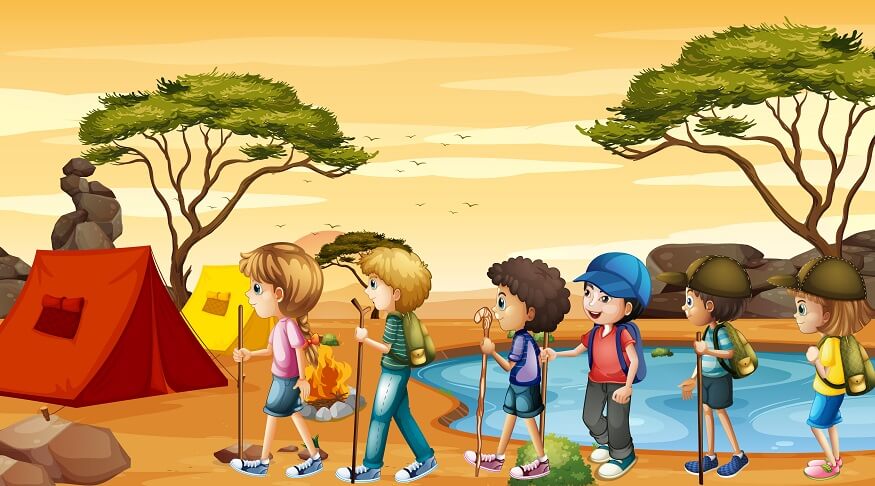During childhood, field trips and educational visits were some of the most exciting events in schools. Children were always thrilled about spending time outside of school, engaging in exciting activities, and having fun. Field trips not only provided an opportunity for children to bond with their academics and nature in a more exciting and fun way but also offered a chance to learn new information. Learning about topics related to nature while being in nature was way more exciting than learning them in a classroom. Similarly, learning about history while being in a museum was more engaging than learning it while sitting in a classroom. Hence, engaging students by interacting with excursions and field trips is crucial as more learning happens outside the classroom than inside it.
In the era of education accountability, things that do not boost maths and reading scores have fallen out of favour, including field trips. However, is it really much of a loss? After all, most people recall field trips as being more of a lark than a learning experience. But what parents often miss is that field trips are more than just educational. Various studies have been conducted to account for this in the current era of classroom education, which prioritises maths and reading.
Also Read: Car games for kids: Fun Road trip maths games for kids
One of the research studies was conducted by Professor Jay Greene from the University of Arkansas, which was marked by a gold standard random assignment methodology. Greene studied the impact of museum visits and the importance of field trips to other places with respect to their educational validity. He found that these field trips had a significant impact on knowledge retention, which was remarkably high. Similarly, he also found that such trips boosted students’ tolerance and empathy. Greene suggests that these experiences help students register things in a way that is different from a classroom setting. Greene’s work is a valuable argument that experiences that have been pushed aside in an exam-obsessed era may deserve a second look.
Field trips can be a great way for children to learn and grasp more things at a different frequency because more learning happens outside the classroom than inside it. Field trips provide a chance for kids to see the real-world concepts they learn in school and compare them to the information that they receive during an excursion. They definitely can help to break the monotony of classroom learning and expose students to brand new experiences and environments, as it was seen before that learning outside the classroom is clearly more beneficial and a crucial part of education. In this blog post, we will explore the benefits and advantages of school excursions, the aims and objectives of field trips, and how they can enhance students’ learning experience.
Field trips provide hands-on learning experiences that are not possible in a classroom setting. Students can see, touch, and interact with the objects or places they are learning about. For instance, a trip to the planetarium can help students become more aware of the galaxy and increase their knowledge about the planets, stars, and moons around us. Similarly, an excursion to a popular museum in their city can help students understand the history of a particular generation or region.
Also read: Educational Field Trips for Students: Definition and Benefits
Field trips can also enhance kids’ empirical and cognitive skills. When students are exposed to new environments and experiences, they are forced to think outside the box and come up with creative solutions to problems. Learning outside the classroom, for example, a field trip to a Science Center can help students understand complex scientific concepts through interactive exhibits and demonstrations. They can also participate in experiments and activities that require them to think critically and solve problems.
Field trips also encourage social and emotional development. Students can communicate with their peers and teachers outside of the usual classroom setting. This exchange can promote building relationships, develop communication skills, and stimulate empathy and respect towards others. Field trips can also be used as a resource for motivation for students, especially those who may be struggling with behavioural and personal challenges. School excursions can also boost confidence in students. The importance of field trips can be deciphered when students are exposed to new environments and experiences. They are forced to think outside the box and come up with creative solutions to problems. This can help to build self-esteem and confidence in their abilities. Additionally, students who may struggle in the traditional classroom setting may excel on excursions where they can demonstrate their skills and knowledge in a different context. These experiences can broaden students’ horizons and help them to develop a deeper understanding and appreciation of other cultures. This is the importance of field trips.
Finally, school excursions can improve academic performance. When students are engaged in hands-on learning experiences, they are more likely to remember what they have learned. This can improve retention of information and lead to better academic performance. Additionally, school excursions can help to motivate students who may be struggling with academic and personal challenges.
Also read : 20 Road Trip Activities to Keep Children Engaged
School excursions have a positive impact on students’ personal and academic development. They enhance the learning experience, improve social skills, boost confidence, provide cultural enrichment, and improve academic performance. It is important for educators to incorporate school excursions into their syllabus.
At EuroSchool, we incorporate academic learning both inside and outside of the classroom. We believe it is a crucial part of retention and educational growth. We encourage kids to take part in these activities so that these school excursions can be helpful in personality and confidence development for children.









